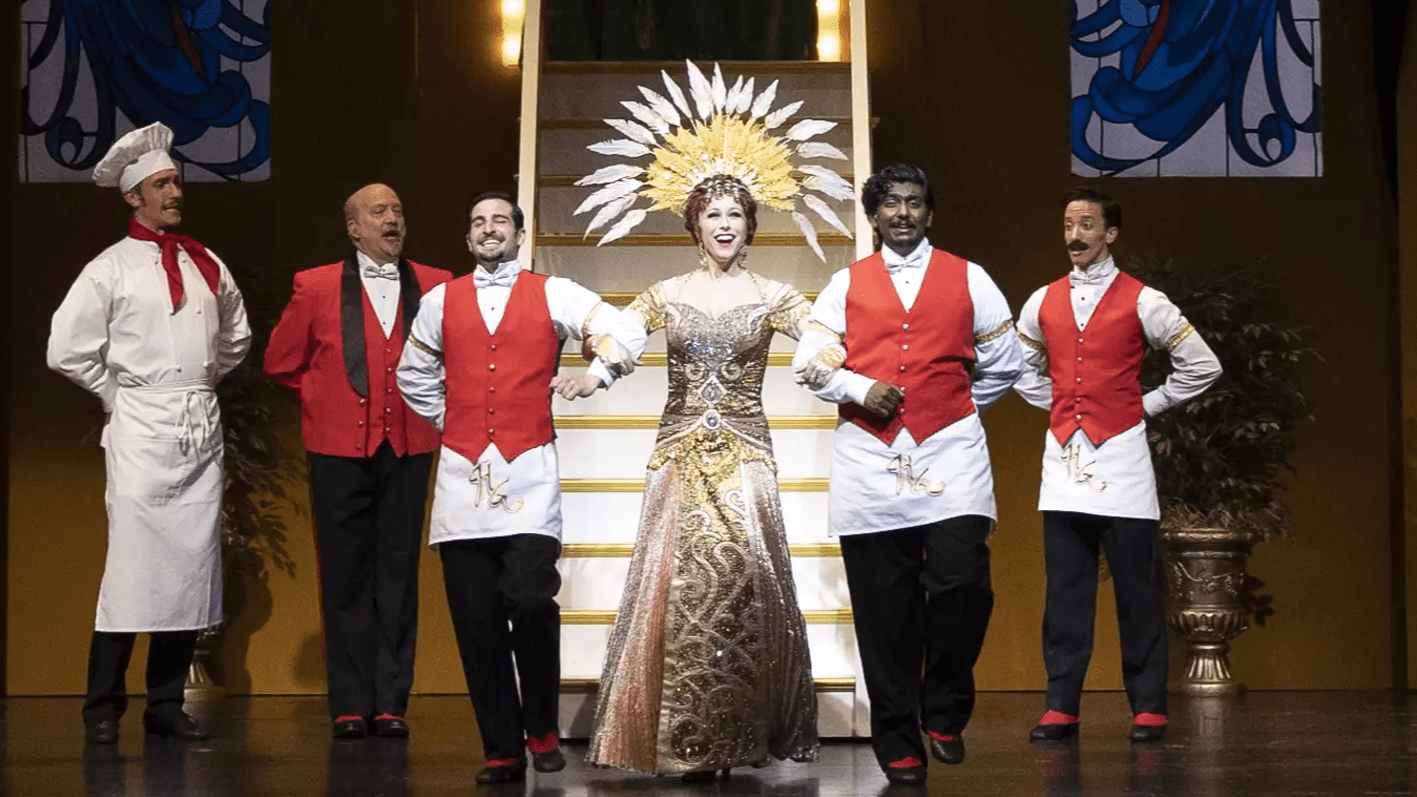SALT LAKE CITY — The act one finale of Hello, Dolly! is “Before the Parade Passes By,” an anthem about soldiering forward in life. Like a parade, Pioneer Theatre Company’s Hello, Dolly! is not destined to last forever, and Utah audiences should watch this phenomenal production before it passes by.
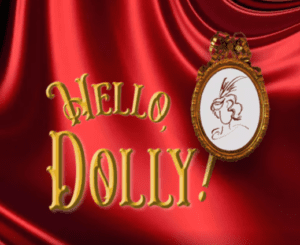
Hello, Dolly! is based on the otherwise forgotten play The Matchmaker by Thornton Wilder. In this musical adaptation (with a script by Michael Stewart and music and lyrics by Jerry Herman), the title character is a widow who makes a living as — among other things — a matchmaker. One of her clients is the artist Ambrose Kemper, who is in love with the young Ermengarde. This gives Dolly the opportunity to worm her way into the life of Ermengarde’s widower uncle, Horace Vandergelder, with the plan on marrying Horace and using his wealth to improve the lives of others. Horace has two clerks, Cornelius Hackl and Barnaby Tucker, who scheme to visit New York City for the day. In the process, they fall in love with the milliner Irene Molloy and her assistant Minnie Fay, respectively, and must figure out how to woo the women while lacking wealth, experience, or sophistication.
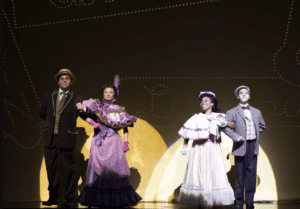
Paige Davis portrays a Dolly Levi unlike any other. Her Dolly has sass and a twinkle in her eye that make the character endlessly endearing. Davis portrays Dolly as a smart woman who manages events to unfold exactly as she wants them to. Davis dominates the stage, whether she is confidently talking through the rapid humor of Stewart’s script, or leading a large ensemble musical number. This is Dolly’s world; everyone else is just living in it.
With her brassy voice and strong vocal control, Davis is a master of the big finish, as shown in her triumphant final notes of “Before the Parade Passes By,” “I Put My Hand In,” and “So Long, Dearie.” She also exudes joy in her songs, such as when she revels in the attention from the waiters at the Harmonia Gardens restaurant during “Hello, Dolly!” Yet, Davis was also adept at the quieter moments of the show, and her soliloquies addressed to Dolly’s deceased husband, Ephraim, were full of tenderness and heart.
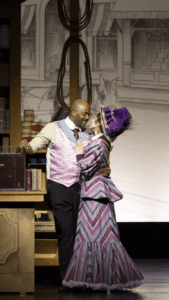
Playing opposite of Davis is Kris Coleman as Horace Vandergelder. Coleman plays Horace as a lovable grouch. Sometimes, though, his performance was too broad (such as when he was imagining the wealth of Ernestina Money). When this occurred while Davis was on stage, it was too extreme to have both of them giving exaggerated performances. The script does not give Horace much variety, but Coleman seized every opportunity to give depth to Horace, and I appreciated the character’s softness at the end of the play and his embarrassment at Ernestina’s behavior in the restaurant.
As Cornelius, Alexander Mendoza sang the opening of “Put on Your Sunday Clothes” with determination, which supported the character’s rebellious decision to visit New York City. Cornelius’s eagerness to learn to dance in the hat shop was a cute moment, and I found the character easy to cheer for. Michael J. Rios looks convincing playing a 17-year-old, thanks to his short stature and youthful exuberance. His grace during “Dancing” and nervousness while counting money at the restaurant were especially memorable moments from an all-around great performance. In the role of Irene Molloy, Kelly McCormick gave a wistful, yearning rendition of “Ribbons Down My Back,” and her chemistry with Mendoza made “Dancing” and “It Only Takes a Moment” romantically charged. Finally, Dori Waymer was a fun Minnie Fay, especially during “Elegance” and during the restaurant scene.
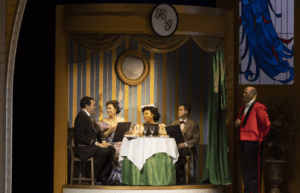
It takes a woman like Karen Azenberg to direct and choreograph Hello, Dolly! well enough to elevate its script and score to greatness. “The Waiters’ Gallop” featured an athletic mix of gymnastics and high-energy dancing that made me feel winded just watching it. “Elegance” was a smash hit, thanks to the rigid nonchalance of the dancing and a final visual joke. “Dancing” was the best ballet that audiences will see in a musical this year, and I was entranced by the graceful turns that unfurled the women’s skirts and men’s suit jackets. Also, the thrilling lifts in “Dancing” made the women seem to hover in the air. In “Call on Dolly” and “Put on Your Sunday Clothes,” Azenberg had the ensemble members flow around the stage in seemingly random paths, before stopping and posing for an instant for a compelling stage picture that would melt away seconds later. Azenberg places actors on stage with the precision of a brain surgeon, and even the most trivial scenes profit from her expertise. However, there was an incongruency in “Before the Parade Passes By” in which the ensemble protested with placards and signs during a joyous song happening during a celebratory parade.
Assisting Azenberg was a supremely talented group of artists and designers. “Put on Your Sunday Clothes” never sounded so good, thanks to the work of conductor and music director Phil Reno in perfecting the vocal harmonies and coaxing power and emotion from the cast. Scenic designer James Noone created sets that could quickly move on and off stage, making the action flow quickly form scene to scene. My favorite contribution, though, was from costume designer Eduardo Sicangco, who created wonderful period clothes that were faithful to the 1890s setting. Women wore ankle-length skirts and jackets that had puffy sleeves and a tight waist, while the men wore period suits and vests. Of course, the standout costume is always going to be Dolly’s dress at the Harmonia Gardens. Sicangco dressed Davis in a gold, with sequins covering the bodice and front and back panels of the skirt; underneath was a shimmery pink skirt that added a different type of glamor to the costume. Atop Davis’s head was a yellow and white feathered headdress. The overall effect was a costume that was impossible to ignore and that made Dolly bubble with life and energy.
It is difficult to rave too much about Hello, Dolly! at Pioneer Theatre Company. This show is a superb theatrical experience where so much seems to go right. The worst part of Hello, Dolly! is that it only lasts until May 28. Audiences should get their tickets and see it before this parade passes by.
[box]The Pioneer Theatre Company production of Hello, Dolly! plays Mondays through Thursdays at 7 PM, Fridays and Saturdays at 7:30 PM, and Saturdays at 2 PM at the Simmons Memorial Pioneer Theater (300 South 1400 East, Salt Lake City). Tickets are $48-77. For more information, visit pioneertheatre.org.[/box]

